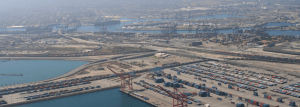
The Port of Los Angeles (photo: John Murphy)
Trade correspondent L.C. reports:
The US Commerce Department announced on May 23rd that it was initiating an investigation as to whether automobile imports – “including SUVs, vans and light trucks, and automotive parts… threaten to impair the national security as defined in Section 232.” This was a stunning move. Congress, business, and US allies abroad are all protesting the Administration’s national security rationale for the threatened auto import tariffs. There was no clamor and not even significant support for them from the domestic automotive industry.
Like the Section 232 steel and aluminum tariffs and US demands for changes to NAFTA rules-of-origin, it could hike costs for domestically-made autos — by raising the price of imported parts and disrupting supply chains — and make them less competitive. This would raise domestic vehicle prices and transportation costs over. It would crimp consumer choices and likely provoke foreign retaliation. The downsides were obvious, and the negative response came quickly, compounding the anxiety triggered by the White House’s apparent retreat on China and its sanctions-violating communication firm ZTE.
The move spurred talk of congressional action to rein in the President’s unilateral trade powers, but a bill to do so, even if passed by Congress, would likely be vetoed by the President.
The cascade of protests led by Republican senators and business associations, and from allied countries, made it clear that the national security rationale is not finding much support outside the Administration. That it was undertaken without prior consultation with members of Congress or most of the domestic industry was also vexing.
If the auto probe follows the model of the steel and aluminum Section 232 cases, it will lead to an immediate jump in the import of foreign vehicles as importers move to get in as much inventory as they can before the likely tariff hit.
The national security rationale breaks down as soon as one looks at US vehicle imports. The five largest exporters of vehicles to the US are close allies: Mexico and Canada (together accounting for about half of US car imports), Japan (about 21%), the EU, and South Korea (all five accounting for 98% of imports). So even more than in the steel and aluminum cases, it would be difficult to make a credible case for a national security threat. Moreover, the domestic industry has been thriving. “Arguing that passenger cars are a national security threat… would make a mockery” of Section 232, as trade expert William Reinsch put it.
There is speculation that the White House doesn’t necessarily want the investigation to lead to tariffs but launched it to use as leverage with trading partners on other matters. Most immediately, it is speculated that the move is intended to put pressure on the NAFTA renegotiation, pushing Mexico to accept the tough US auto domestic-content demands. (Currently Mexico and Canada face no US tariffs on cars or parts.) It is also thought the move may be used to put pressure on other countries, mainly Japan and the EU, with whom the US is seeking steel voluntary restraint agreements and could also try to get VRAs for cars.
Whatever the motivation or plan, the new Section 232 investigation could further undermine the World Trade Organization (WTO). Making another claim for large tariff hikes justified under the GATT national security exception will strain the system, already stressed by the steel and aluminum tariffs. If auto tariffs are imposed, there will almost certainly be WTO challenges, and since they would come from the US’s closest allies, it would disrupt Washington’s efforts to cooperate with them against other bad actors such as China.
Other developments
Momentary US-China truce
US-China trade tensions abated further this week, following President Trump’s decision to lower penalties on China’s ZTE Corp. By mid-week, however, it appeared that domestic backlash against the ZTE reprieve may have forced the President to stall his rush for a completed deal with China.
Steel and aluminum tariff deadline looms

Savannah’s harbor
The temporary exemptions from the 25% steel and 10% aluminum tariffs imposed under Section 232 expire on June 1st for the exempted countries – Mexico, Canada, and the EU. There have been no clear signals regarding whether the Administration will extend them. Neither the NAFTA talks nor discussions with the EU seem to be making progress. The EU is still talking with the US but has publicly ruled out a VRA and is seeking instead a limited, “lite” bilateral trade deal in exchange for no tariffs.
In free trade agreement (FTA) developments this week, EU trade ministers, meeting on May 22nd, gave the European Commission a mandate to begin FTA negotiations with Australia and with New Zealand.
Brazil’s foreign minister said this week that talks for the planned Japan-MERCOSUR FTA could begin in November on the occasion of the November 30th-December 1st Group of Twenty (G20) summit in Buenos Aires. This coming week MERCOSUR starts talks for a MERCOSUR-South Korea FTA and is already negotiating trade deals with the EU and Canada. The bloc is also discussing integrating with the Pacific Alliance.
Click here to go to the previous Founders Broadsheet post (“US-China trade war on hold, no NAFTA deal yet, allies unhappy”)

Leave a Reply